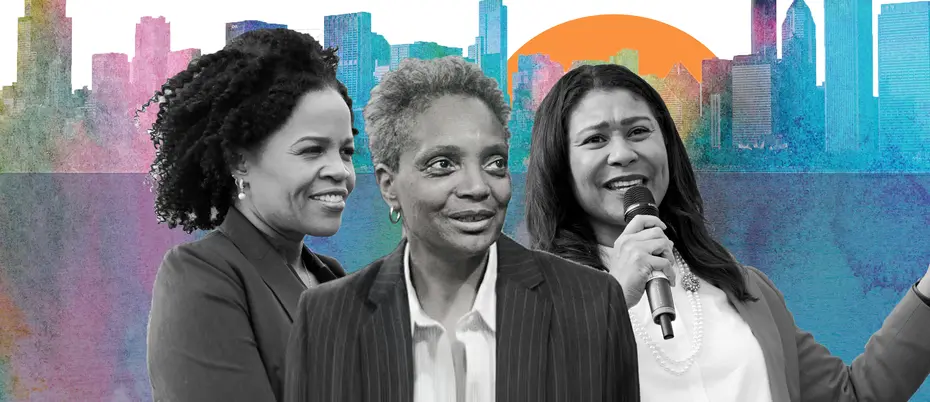Public Policy
Three mayors on building more equitable cities
Achieving equity in American cities will require action, accountability, and financial investment from every corner of city governments.
How can civic leaders cut through bureaucracy and implement policies that foster equity? On Thursday, April 8, MIT Sloan hosted “Going Local: Building More Equitable Cities” to discuss ways to reshape the innovation economy in major urban centers. The discussion united three city mayors: San Francisco mayor London Breed, new Boston mayor Kim Janey, and Chicago mayor Lori Lightfoot. Each is the first Black woman to hold such a position.
former Berkshire Bank executive vice president and current MIT Sloan lecturer who focuses on inclusion in the innovation economy, moderated the blunt yet optimistic discussion. Here are four ways these leaders aim to reshape economies, cultivate inclusion, shepherd urban renewal, and lay the groundwork for lasting change amid the COVID-19 crisis.
Use government as a progressive engine, not a mouthpiece
Lightfoot emphasized that paying lip service to the idea of inclusion isn’t enough. She’s made clear that anyone who brings an idea to her team must filter it through the lens of diversity, and be explicit about how to implement the idea despite bureaucracy.
“You’ve got to be intentional in pursuing equity and inclusion everywhere, and then you’ve got to step back and think about, ‘Well, how do we execute this and operationalize it? What are the barriers to access for entrepreneurs of all types?” she said.
For Lightfoot, that starts in city hall.
“You’ve got to convince everybody on your team, down to the decision-makers buried in the [city departments] … to embrace this value and then hold them accountable with real metrics around making sure that they are operationalizing your values,” she said.
Lightfoot recently enacted several initiatives to promote equity in city contracting, including a $25 million vendor impact fund that provides women- and minority-led businesses with technical assistance to access federal paycheck protection program loans and SBA 7(a) loans. She also issued an executive order scrutinizing reporting measures to understand how diverse firms are used in city contracts.
“While government can’t solve all problems, we do have a unique role to lead by example, and also to be a convener of different resources in a community and set the course and challenge people to think outside of their own comfort zones — particularly when it comes to equity and inclusion,” Lightfoot said.
Foster embedded, accountable systems to combat systemic racism
In Boston, Janey recently appointed a new chief for equity and inclusion, Celina Barrios-Millner, to embed racial justice into citywide operations. One of Lightfoot’s first moves as mayor was to hire the city’s inaugural chief equity officer, Candace Moore. San Francisco’s Breed has similar priorities.
Related Articles
“There have been a lot of very uncomfortable conversations. We’ve provided all city agencies a blueprint that’s a basis for how they can understand equity, and how they can implement changes in their policies within their departments even with their promotions,” Breed said.
But the mayors emphasized that a mere position isn’t enough. It’s important for every city department to pursue equity.
“When we look at San Francisco — and I’ll just be honest about what’s happening, even with [the city] workforce — the people who are laid off the most? African American. The folks who don’t necessarily receive a lot of promotions? African American,” Breed said.
Janey emphasized the need for building pipelines coming out of Boston inner-city public schools for viable careers — like green jobs — in a city that is known as an innovation and education hub.
“We have the best universities and colleges in the entire country, and yet the students that graduate from our public schools have less opportunity and access to get into these colleges and universities. There is a real opportunity, if we’re intentional about not just diversifying our staff and our boards, but making sure that the student body [at universities and colleges] is reflective of the diversity that we see in our cities,” she said.
Invest in housing and combat income inequality
Janey reminded participants that the median net worth for black Bostonians is just $8. Home ownership is a key way to foster intergenerational wealth, and she’s working to make housing more stable throughout the city.
In the short-term, she recently made $50 million in federal funding available to help Bostonians pay rent, utility bills, and moving costs. But this is just the beginning. She vowed to prioritize housing while in office.
“It’s not enough to do the rental relief. We’ve got to help people own their homes. We’ve been denied that opportunity from redlining and other discriminatory practices and policies here and throughout our country, and we’ve got to change that and make sure that there’s real opportunity to build generational wealth,” she said.
San Francisco’s Breed, who grew up in public housing, painted a stark picture of income disparity in her city. The average income of a Black household in San Francisco is $31,000. The average income for a white household is $110,000. Before the pandemic, 37% of San Francisco’s homeless population was Black, while Black people made up only about 6% of the city’s population.
Her administration recently launched an advisory group to explore universal basic income programs. They have already implemented a similar program for artists. Meanwhile, a Dream Keeper Initiative will reinvest $120 million throughout the next two years in the city’s Black community, redirecting resources from law enforcement toward investments in programs that promote housing support, stabilization, and ownership, as well as guaranteed income and workforce training.
Lightfoot said Chicago has invested more than $100 million into small and micro-businesses during the pandemic. Her administration’s Invest South/West initiative aims to revitalize 10 Chicago neighborhoods with more than $750 million in public funding, plus private investments, for job opportunities, better housing, and amenities.
Ignore the critics
Lightfoot ended the conversation by invoking Theodore Roosevelt’s famous “Man in the Arena” quote, which she called “Woman in the Arena” and reads in part:
It is not the critic who counts; not the man who points out how the strong man stumbles, or where the doer of deeds could have done them better. The credit belongs to the man who is actually in the arena.
She underscored the opportunity for three women to serve both as change-makers and as role models.
“Do not underestimate your power and what you can do simply by your presence and then even more by your works,” Lightfoot said.
She spoke directly to Janey, the new Boston mayor: “After the history of never having a person of color, never having a woman as mayor in the city of Boston, you have a blank canvas on which to paint, and we are all here to support you and excited about the prospects.”
“We are ready to do this work, and we’re going to be better than before. We are not going back to normal,” Janey replied.




